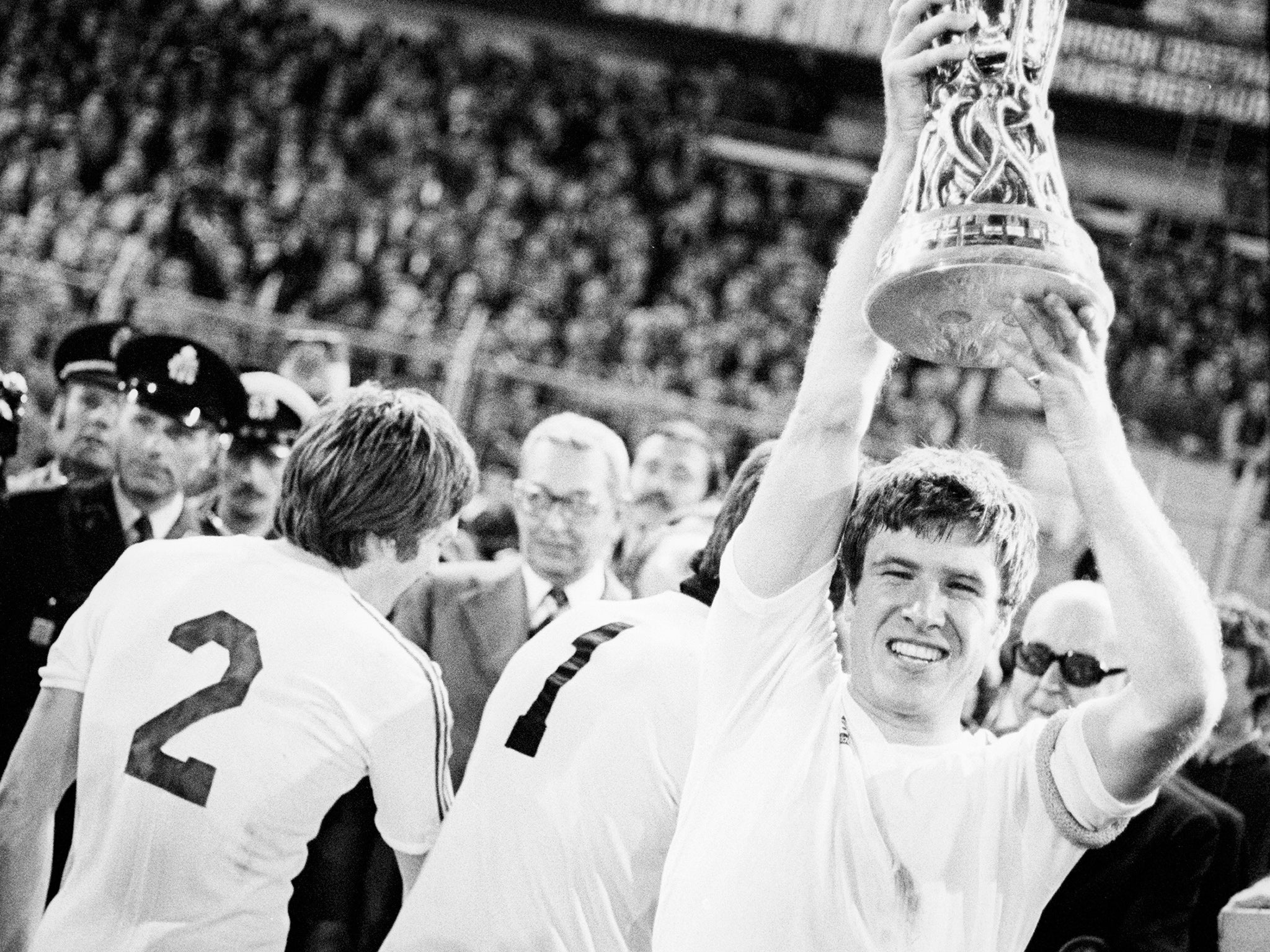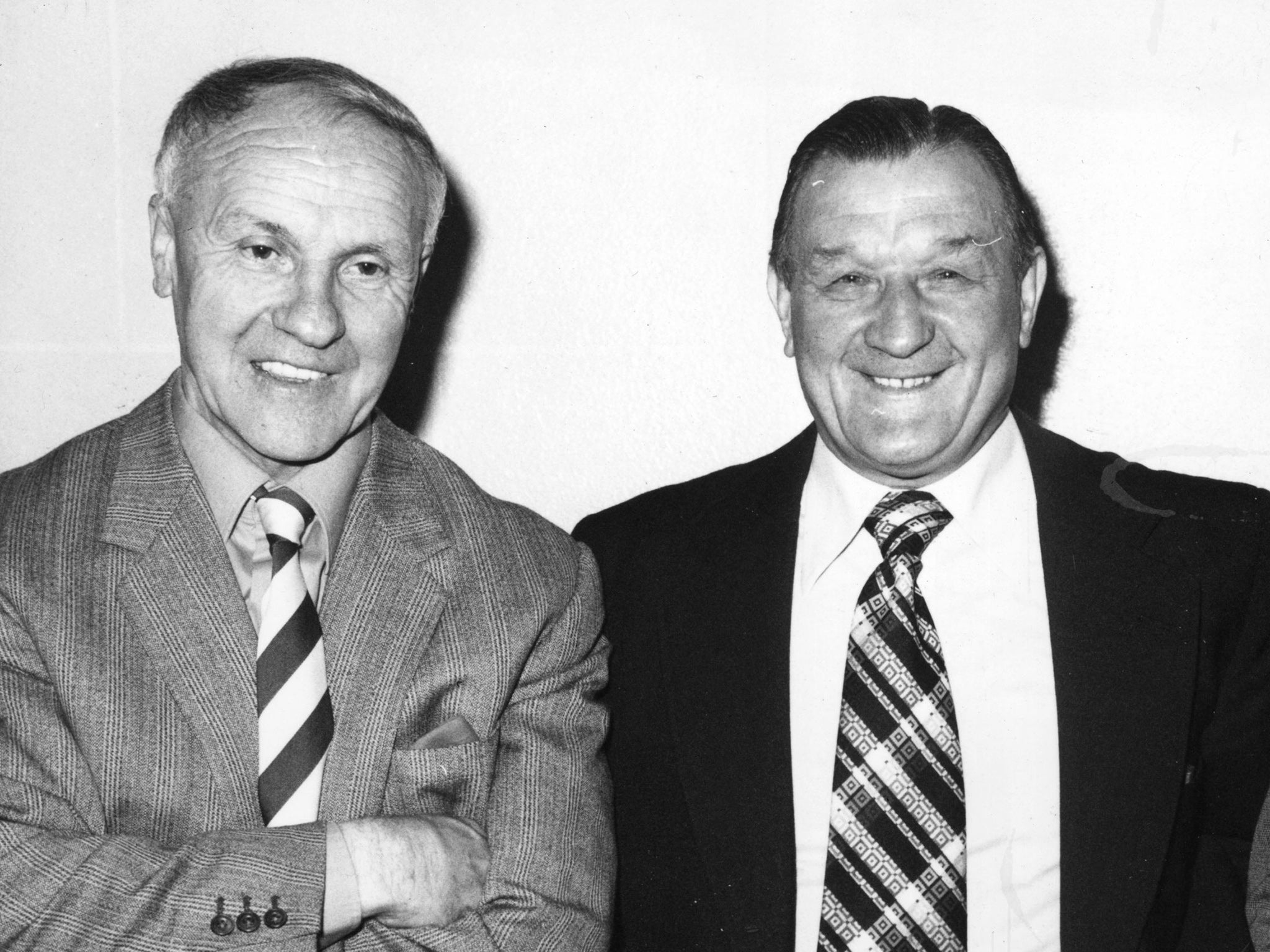Europa League final: How Bob Paisley's European odyssey at Liverpool began 40 years ago this week
Wednesday's Europa League final will be followed by the anniversary of one of Liverpool's most famous nights in the competition

Your support helps us to tell the story
From reproductive rights to climate change to Big Tech, The Independent is on the ground when the story is developing. Whether it's investigating the financials of Elon Musk's pro-Trump PAC or producing our latest documentary, 'The A Word', which shines a light on the American women fighting for reproductive rights, we know how important it is to parse out the facts from the messaging.
At such a critical moment in US history, we need reporters on the ground. Your donation allows us to keep sending journalists to speak to both sides of the story.
The Independent is trusted by Americans across the entire political spectrum. And unlike many other quality news outlets, we choose not to lock Americans out of our reporting and analysis with paywalls. We believe quality journalism should be available to everyone, paid for by those who can afford it.
Your support makes all the difference.George Best always struggled to see how Liverpool managed to beat a talented Bruges side to win the Uefa Cup 40 years ago this week, in a final which rests in the sidelines of the club’s vast collective European memory yet delivered one of their great comebacks in continental competition.
“You look at some of those players and wouldn’t really say they were world class players,” Best said in the television studio before the highlights of the Anfield first leg were screened. “You’ve got a genius in there but they all play… I don‘t know…” His friend Rodney Marsh helped him out. “Yeah the blend of players,” Marsh intervened to say, as Best’s analysis floundered beyond that assessment of Kevin Keegan. “You’ve got leaders like Tommy Smith and then you look at the back five players on that piece of paper and you are not looking at players who are quick players particularly. But they never seem to be put in trouble….”
Liverpool were actually put in a great deal of trouble in an extraordinary first leg, during which the supreme player across the two games – the Belgian international Raoul Lambert – wreaked havoc and brought errors out of one of those five Marsh talked about: a 25-year-old Phil Neal who was in only his second Liverpool season. Bob Paisley’s side found themselves two goals down inside 12 minutes and seemed destined to have one of those nights when Kevin Keegan’s effort from 30 yards was tipped over the bar by goalkeeper Birger Jensen.
But though Paisley had little to offer by way of words at half-time – the big speeches were never his thing, even when the chips were down – his tactical switch for the second half affected the course of the evening. John Toshack, whom Paisley loved to play in Europe because continental defenders were uncomfortable with the big target man striker, was removed, Jimmy Case sent on and Liverpool attacked down the flanks instead. Case immediately scuffed an easy opportunity on a cut-up mud-caked Anfield pitch but Liverpool scored three times in five minutes around the hour mark – scorers: Ray Kennedy, Case and, inevitably, Keegan, from the penalty spot – to send Liverpool to northern Belgium with a lead. Over there, Lambert scored an early penalty, awarded for a handball which looks as marginal four decades on as it did at the time, and hit the post during a second half in which he caused a young Phil Thompson the same trouble he had Neal at Anfield. But Keegan’s crashed 15-yard equaliser in that second leg was enough and the side held out to win.
Toshack and Paisley were never the closest confidantes and the striker was devastated to have been removed from the action so early at Anfield, yet he could reflect years later that Paisley’s decision was visionary and not something he could argue with. “A change of approach was needed and the final scoreline was a tribute to the tactical knowledge of Paisley as much as anything else,” Toshack said. “I accepted what had happened and knuckled down to training in preparation for the championship decider at Molineux.”
That occasion at Wolverhampton Wanderers also proved Paisley’s vocal command of a dressing room to be rather less than it might have been. Thompson’s brothers could not get into the ground, Paisley requisitioned the key to a door which led directly from the changing room out onto the street and unlocked it to allow the pair and their friends in. He then found himself overwhelmed by 50 more supporters who wandered in on the players’ preparations and then on out towards the stands. Liverpool won the match and the First Division.
The Bruges match was significant because it provided the first rewards of a Paisley European strategy which, to a large extent, distinguished his approach to the game from that of his predecessor Bill Shankly.
No attacking from the back for you tonight, my lad
Shankly was tactically astute too, of course. He was obsessed with all the small details of rebuilding Liverpool. But there were times when his Messianic belief that the club would win in Europe because they were the best and the Europeans were… well, just Europeans… simply did not stack up. Shankly described Ajax as “too defensive” after they took Liverpool apart 5-1 in 1966. He said Borussia Dortmund had been “frightened men” when they beat Liverpool 2-1 in that year’s European Cup Winners’ Cup final, which the Germans won 2-1 at Hampden Park. It is generally acknowledged that a defeat to Red Star Belgrade in 1973 convinced him that there must be a change of philosophy, though he had resigned within a year.
Paisley believed that patience was necessary in Europe. After he had taken over as manager from Shankly in 1974, his sides laid siege far less and went for a possession based football that drew opposition out, allowing Liverpool to strike at them on the counter attack. “The quickest way forward is to push the ball back and frustrate your opponents into making mistakes,” as Smith later reflected. It meant a different, slower, more pragmatic style in Europe to the game which had made Liverpool so ascendant in the First Division. Neal had been signed as an attacking full-back and encouraged to advance into opposition territory, though before the 1976 UefaCup semi-final first leg against Barcelona at the Nou Camp, Paisley’s instructions were clear. “No attacking from the back for you tonight, my lad,” he told him. Paisley did not always go in for worrying about the opposition – one of the many traits he picked up and retained from Shankly – but the presence in the Spanish side of Carles Rexach, who was Neal’s man, contributed to his caution.

There were no hard and fast rules. Success entailed adaptability. But Paisley also appreciated that a more mobile and rapid central defensive pairing, comprised of players who were comfortable on the ball, made a difference, because the continental sides had fewer of the Toshack-like centre forwards who were so dangerous in England, to contend with. Many of Paisleys defenders - Emlyn Hughes, Phil Thompson, Alan Hansen, Alan Kennedy and Phil Neal - had started as midfielders and found themselves re-invented by him, with Europe very much in mind.
What continental sides also discovered was a Liverpool whose relentless – and sometimes tedious - training ground work had perfected a pass and move system they had never encountered before. Liverpool’s players always ran for each other and always created an option. So, in a sense Best’s assessment was right. There were not many players in the line-up who might have made a World XI. “European teams coming up against us would not have had a notion about how together, how organised, how willing to run for each other we were,” says Steve Heighway, who won the penalty Keegan converted at Anfield in the Bruges first leg. “It was a really hard working group. To win so much for so long without enormous amounts of flair is quite surprising.”
There was something rather homespun about the way Liverpool paraded the Uefa Cup around the new Olympiastadion on the night of May 19, 1976. The base of the trophy actually fell off. But that was Paisley’s way: populating his sides with underestimated players whom no one thought world class, then watching them win, again and again and again. They would win three European Cups under his management, but the story of unparalleled continental success began on a spring night in Bruges, 40 years ago on Thursday.
Join our commenting forum
Join thought-provoking conversations, follow other Independent readers and see their replies
Comments